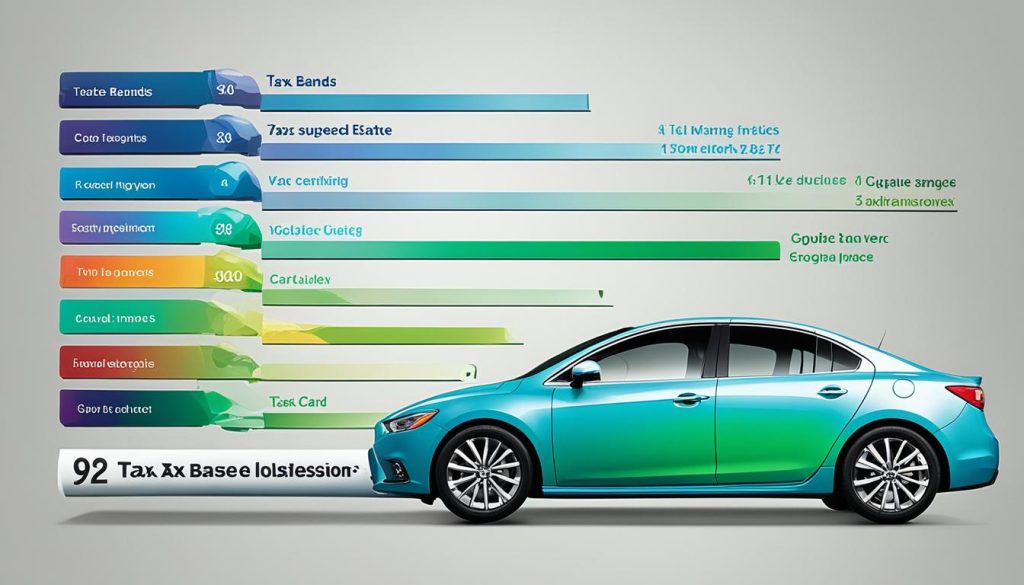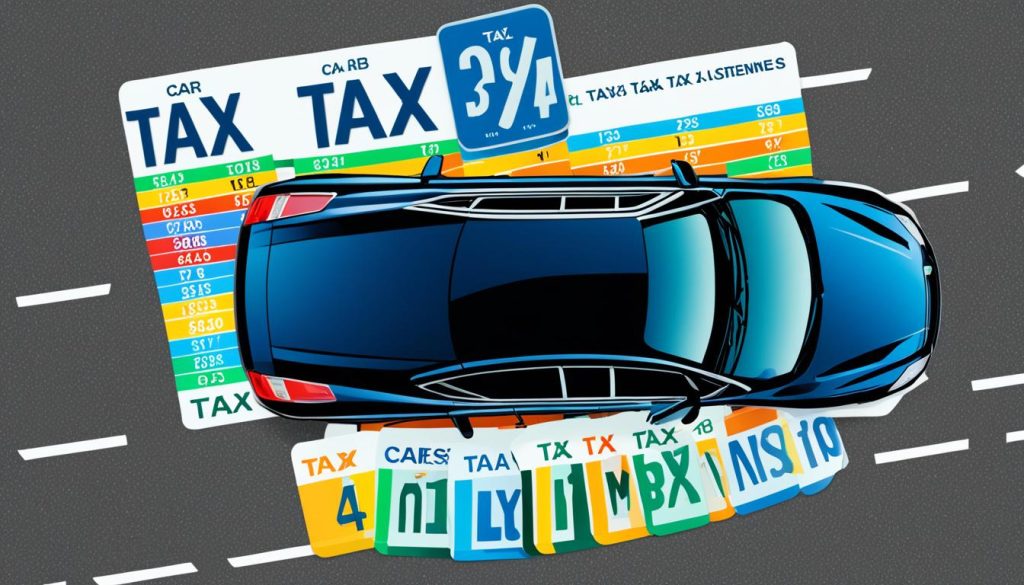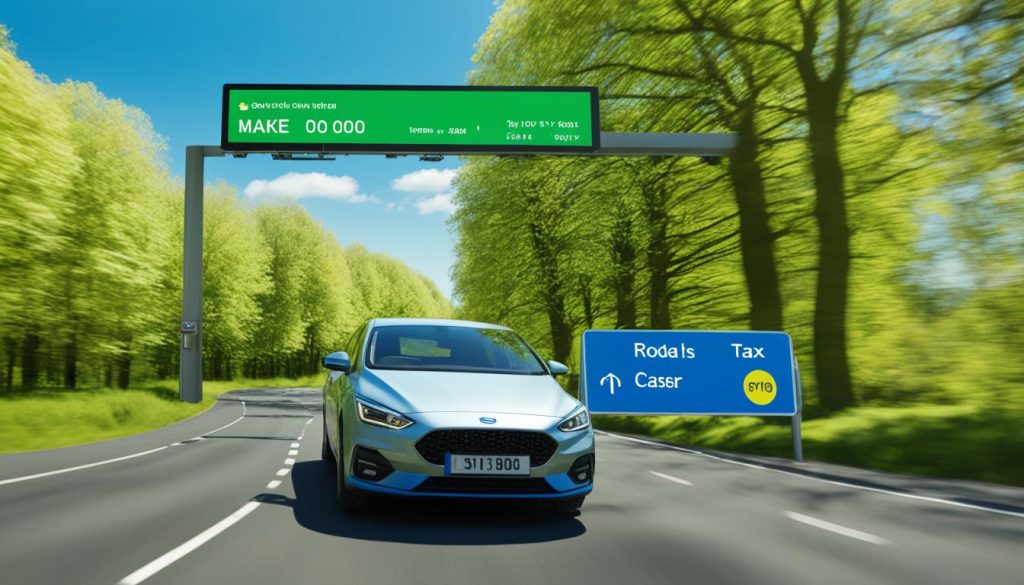When it comes to taxing your car in the United Kingdom, it’s important to know how much you need to pay. Understanding the vehicle tax rates and using a car tax calculator can help you determine the amount you owe. Whether you’re driving a brand-new vehicle or an older model, the tax amount varies based on several factors.
Factors that determine your car tax include the registration date, CO2 emissions, and fuel type. If your car was registered on or after 1 April 2017, the initial tax payment is based on the CO2 emissions. For subsequent tax payments, the rates depend on the fuel type. Keep in mind that vehicles with a list price over £40,000 may have additional fees.
To calculate the exact amount of tax you need to pay for your car, you can use a car tax calculator. This online tool takes into account the necessary information and provides you with an accurate tax amount.
Stay tuned to find out more about vehicle tax bands and rates, as well as how to pay for your car tax!
How Much to Tax My Car?
When it comes to determining the cost of road tax for your car in the UK, it is important to understand the concept of vehicle tax bands. These bands are determined based on several factors, including engine size, fuel type, and CO2 emissions. The rates for vehicle tax are split into different bands, with lower emissions resulting in lower vehicle tax costs.
For cars registered between 1 March 2001 and 31 March 2017, the tax rates are based on CO2 emissions. The lower the CO2 emissions, the lower the tax band and cost. Cars registered after 1 April 2017 fall into one of three road tax bands: zero, standard, or premium. The specific band and rates depend on the car’s CO2 emissions and fuel type.
It is worth noting that electric cars and vehicles with a list price over £40,000 have specific tax rules. These vehicles may be subject to different rates or exemptions.
To determine the tax band and corresponding rates for your car, you can refer to your vehicle’s V5C logbook. Alternatively, you can use a car tax calculator that takes into account the necessary factors to provide you with an accurate estimate.
| Vehicle Tax Band | CO2 Emissions (g/km) | Vehicle Tax Rate |
|---|---|---|
| Zero | 0 | No tax |
| Standard | 1 – 50 | £150 |
| 51 – 75 | £215 | |
| 76 – 90 | £165 | |
| 91 – 100 | £205 | |
| 101 – 110 | £165 | |
| 111 – 130 | £205 | |
| 131 – 150 | £165 |

Understanding the vehicle tax bands and rates can help you estimate the road tax cost for your car. By considering the engine size, fuel type, and CO2 emissions, you can ensure that you are prepared for the tax payment and avoid any surprises. Remember to consult your vehicle’s V5C logbook or use a reliable car tax calculator to determine the specific tax band and rates for your car.
How to Find Out Your Car’s Tax Band?
When it comes to determining the tax band for your car in the UK, knowing its year of registration is crucial. This information can be found in your vehicle’s V5C logbook, which contains essential details about your car’s history and legal documentation. Once you have access to the V5C logbook, you can easily identify the specific tax band and annual cost for your vehicle.
Before proceeding with the tax application, it’s important to ensure that your car meets certain prerequisites. Valid car insurance and a valid MOT are mandatory requirements that must be fulfilled before taxing your vehicle. These checks are done electronically as part of the tax application process, so verifying them beforehand will save you time and ensure a smooth transaction.
If you prefer a more convenient and faster method to find out your car’s tax band, you can utilize online tools or vehicle tax check services. These resources provide an efficient way to retrieve the necessary information without having to search through physical documents. Simply enter your car registration details, and the system will provide you with accurate and up-to-date data regarding your car’s tax band.
By utilizing the information available in your V5C logbook or online resources, you can easily find out your car’s tax band and be well-informed about its associated costs. This knowledge will enable you to make proper financial arrangements and ensure compliance with the UK’s vehicle tax regulations.

How to Pay for Your Car Tax?
The easiest and most convenient way to pay for your car tax is to do it online. This method allows you to complete the tax payment quickly and securely from the comfort of your own home. To initiate the online payment, you will need a reference number. This reference number can be found on various documents, such as a recent reminder letter, your vehicle logbook, or the new keeper supplement.
Once you have the reference number, you can visit the official website of the Driver and Vehicle Licensing Agency (DVLA) and follow the instructions to make the payment. The online system accepts different payment methods, including debit card, credit card, and direct debit. It’s important to note that if you choose to pay through direct debit, additional charges may apply.
If you prefer to make the payment in person, you can visit your nearest Post Office. Simply bring the required documents and inform the staff that you would like to pay for your car tax. They will guide you through the process and help you complete the payment. However, please be aware that paying at a Post Office may not be as quick and efficient as making the payment online.
To help you estimate the amount you need to pay for your car tax, you can use car tax calculator tools or road tax estimators available online. These resources take into account factors such as the car’s registration date, CO2 emissions, and fuel type to provide you with an approximate tax amount.

| Payment Method | Pros | Cons |
|---|---|---|
| Online Payment | Convenient and fast | Additional charges for direct debit |
| Payment at Post Office | Assistance from staff | May take longer than online payment |
Conclusion
Calculating and paying for car tax in the UK is a straightforward process if you know the factors that determine the rates. When determining how much to tax your car, consider the registration date, CO2 emissions, fuel type, and list price. By understanding these factors, you can determine the tax band and corresponding rates for your vehicle. Utilizing online tools such as car tax calculators and road tax estimators can help you quickly calculate the amount you need to pay.
To avoid penalties and legal consequences, it is essential to ensure timely payment of your car tax. By following the proper procedures and staying up to date with your payments, you can confidently and correctly tax your car in the UK. Remember, failing to pay the appropriate tax amount can result in fines and other consequences, so make it a priority to meet your car tax obligations.
To simplify the process, use online resources that provide car tax calculators and road tax estimators. These tools can help you determine how much tax you need to pay, with just a few simple inputs. By accurately calculating your car tax, you can budget accordingly and avoid any surprises. Keep in mind that car tax rates may change over time, so stay informed and stay vigilant about staying compliant with the UK’s car tax regulations.
FAQs
How is car tax in the UK calculated?
Car tax in the UK is calculated based on factors such as the car’s registration date, CO2 emissions, fuel type, and list price. Rates vary depending on these factors, and you can use a car tax calculator to determine the exact amount you need to pay.
How are vehicle tax bands determined?
Vehicle tax bands in the UK are determined based on factors such as engine size, fuel type, and CO2 emissions. For cars registered between March 2001 and March 2017, the tax rates are split into different CO2 bands, with lower emissions resulting in lower vehicle tax. Cars registered after April 2017 are subject to the three new road tax bands: zero, standard, and premium.
How can I find out the tax band of my car?
To find out the tax band of your car, you need to know its year of registration. You can find this information in your vehicle’s V5C logbook. Once you know the year of registration, you can determine the specific tax band and yearly cost for your car. You can also use online tools or vehicle tax check services to quickly find out your car’s tax band.
What are the different ways to pay for car tax?
The easiest way to pay for your car tax in the UK is to do it online. To complete the tax payment, you will need a reference number from documents such as a recent reminder letter, vehicle logbook, or new keeper supplement. The online system allows for payment via debit card, credit card, or direct debit. Alternatively, you can also pay for your car tax at a Post Office.
What happens if I don’t pay my car tax?
It is important to ensure timely payment of car tax to avoid penalties and legal consequences. If you fail to pay your car tax, you may be issued a fine and your vehicle may be clamped or impounded. It is recommended to follow the proper procedures and keep up with the required payments to avoid any complications.

